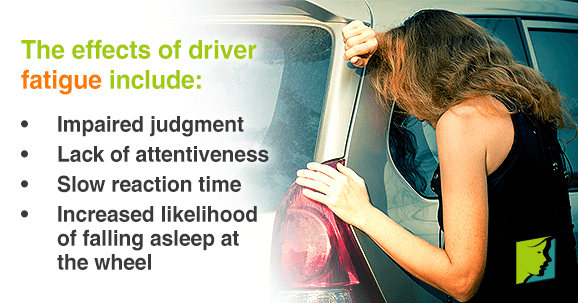Driving while fatigued is highly dangerous; in fact, fatigue is responsible for approximately 20 - 30% of all deaths on the road. When tired, a driver often has the same slowed reaction time and impaired judgment that she would if she was driving under the influence of alcohol or drugs,so the chances of crashing because of fatigue increase four-fold after 10pm, people over 50 are more often involved in fatigue-related crashes between noon and 6pm. Keep reading to find out more about fatigue in middle-aged women and what this means for driving.
Fatigue and Middle-aged Women
There are a number of ways being middle-aged can lead to higher chances of fatigue. Although it can affect anyone of any age, and the possible reasons are numerous, there are a number of risk factors to be aware of when you reach middle-age.
Fibromyalgia
This is a condition that affects the body and often causes sleep problems and chronic daytime fatigue. Around 80 - 90% of people diagnosed are women, and this can easily lead to instances of driving while fatigued and increasing the likelihood of having an accident. The causes are mainly genetics or being exposed to traumatic events.
Chronic fatigue syndrome (CFS)
This is characterized by a constant state of exhaustion, and does not disappear even after sleep or rest. It can be cured, but this should be done as soon as possible - not only is it dangerous on its own (sometimes leading to long-term illness or disability), it can also place the person in dangerous situations, such as driving while fatigued. CFS can develop in anybody, but it is more common in women than men, and normally develops up to the mid-40s. This means that many middle-aged women are a risk of fatigue-related accidents while on the road.
Menopause
Some women experience fatigue as a symptom of menopause. This is due to a number of factors, such as hormonal changes, other symptoms causing disturbed sleep (such as night sweats and insomnia), stress, or fear and concerns about life changes. As menopause normally occurs between the ages of 45 and 55, menopausal fatigue is a risk factor in middle-aged women with regards to driving.
How Does Fatigue Affect Driving?
It is generally recommended that a driver rest every two hours in order to avoid the effects of driver fatigue, which include:
- Impaired judgment
- Lack of attentiveness
- Slow reaction times
- Increased likelihood of falling asleep at the wheel
Normally, before an accident, there are warning signs, which must be taken as an important sign to stop at the nearest safe place, especially if you experiencing symptoms of fatigue. A few examples are:
- Wandering over the lane lines
- Lack of concentration
- Unexplained speed changes
- "Micro sleeps" or dozing off
As well as resting regularly during the drive, there are other things that can be done to prevent fatigue affecting your journey.
Avoiding Fatigue
Follow these tips to prevent fatigue during the day:
- If you feel you might have CFS, fibromyalgia, or fatigue as a menopausal symptom, see a doctor as soon as possible. These conditions can all be dealt with, and this could prevent injury or even death on the road.
- Get a good night's sleep before traveling.
- Avoid driving during normal sleep hours if it can be helped.
- Do not begin driving if you already feel tired.
- Share the driving task with others if possible.
Although being a middle-aged woman is not a risk factor in fatigue-related car crashes by itself, aging can increase the likelihood of developing fatigue for various reasons, and this in turn can cause danger on the roads. Dealing with the underlying causes of fatigue is essential, but even if these have been ruled out, a sensible approach to driving should always be taken.
Sources
- National Health Service UK. (2013). Chronic fatigue syndrome. Retrieved September 2, 2014, from http://www.nhs.uk/conditions/Chronic-fatigue-syndrome/Pages/Introduction.aspx
- National Highway Traffic Safety Administration. (n.d.). Drowsy Driving and Automobile Crashes. Retrieved September 2, 2014, from http://www.nhtsa.gov/people/injury/drowsy_driving1/drowsy.html#IV.%20RISKS%20FOR%20DROWSY
- National Institutes of Health. (n.d.). Menopause. Time For A Change. Retrieved September 2, 2014, from http://www.nia.nih.gov/sites/default/files/menopause_time_for_a_change.pdf
- National Institute on Aging. (2012). Fatigue: More Than Being Tired. Retrieved September 2, 2014, from http://www.nia.nih.gov/health/publication/fatigue
- Office on Women's Health. (2012). Fibromyalgia fact sheet. Retrieved September 2, 2014, from http://www.womenshealth.gov/publications/our-publications/fact-sheet/fibromyalgia.html
- Women's Health Concern. (n.d.). Focus on...The menopause. Retrieved September 2, 2014, from http://www.womens-health-concern.org/help/focuson/focus_menopause.html




